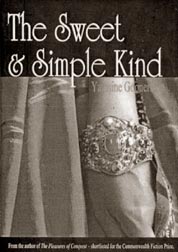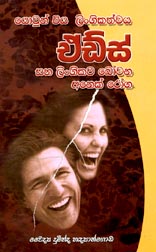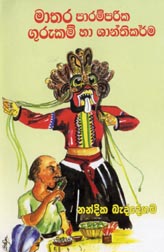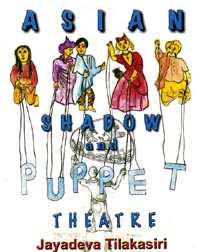![[Book reviews]](Bookreview.jpg)
Vision of social disintegration
The Sweet & Simple Kind
Author: Yasmine Gooneratne
Review: Prof. Rajiva WIJESINGHE
 FICTION: The Sweet and Simple Kind, Yasmine Gooneratne's latest
novel, is at 645 pages one of those loose and baggy monsters, as
Victorian novels were once described. Since I am a firm believer in the
excellence of Victorian novels, I was pleased to see the book, and
reading it through, with inevitable pauses and the reflections they
facilitate, was no disappointment. FICTION: The Sweet and Simple Kind, Yasmine Gooneratne's latest
novel, is at 645 pages one of those loose and baggy monsters, as
Victorian novels were once described. Since I am a firm believer in the
excellence of Victorian novels, I was pleased to see the book, and
reading it through, with inevitable pauses and the reflections they
facilitate, was no disappointment.
Such monsters present a panorama of life, with illuminating moral and
social analysis. The classic kind, the novels of Dickens and Thackeray
and Trollope and George Eliot, generally have more than one main focus,
and the interweaving of a couple or more stories serve to make clear the
inter-related nature of the moral and social problems that are
presented.
The later version, by practitioners such as Henry James, who indeed
looked down on such loose incorporation of much baggage, usually
concentrated on a single subject, though this was explored at great
length, over a span of years in the best examples such as The Portrait
of a Lady or Lord Jim.
The Sweet and Simple Kind is of this latter sort, and is in effect a
bildungsroman, a growing up novel, about Latha Wijesinha, a girl from a
distinguished family who read English at Peradeniya.
Obviously there are similarities with Yasmine herself, born a
Bandaranaike, who however belonged to a very prominent branch of the
family.
Latha however belongs to what might be termed a cadet branch of the
Wijesinhas, not a name that suggests any very exalted lineage, though in
the novel the branch headed by Rowland Wijesinha is very exalted indeed.
Ethnic riots
Rowland Wijesinha is a Christian, who takes to politics and becomes a
champion of a Sinhala Buddhist identity, and is clearly intended to
recall the head of the most exalted branch of the Bandaranaikes.
Unlike SWRD however, Roland does not become Prime Minister, and when
he is shot, it seems to be accidental, the attack having been primarily
on a colleague with whom he was walking on Galle Face Green, the Kandyan
aristocrat D K Beliwatte.
At this stage however Gooneratne has great fun, mixing up identities
in a manner I found immensely entertaining, having tried something of
the sort myself in Acts of Faith, my novel about the 1983 ethnic riots.
In this novel, Rowland Wijesinha's widow, his cousin Moira, contests
the bye-election caused by the death of Beliwatte, to whom she was
related.
At the end of the novel, though this happens long after Roland dies,
we find that she is Prime Minister, and thoroughly enjoying herself,
with flunkies dress 'in an all-white outfit with a crimson and gold sash
and white gloves - I had thought that kind of thing went out with the
British, but I was obviously mistaken'.
But while Gooneratne's sharpest satire is directed at the political
antics of her heroine's relations, her deeper moral concerns relate to
the younger generation, as represented most tellingly by Rowland's two
older children, Ranil and Tara, names that one suspects are not
arbitrary, given Gooneratne's wider social perspectives.
They are the children not of Moira, but of an Indian Tamil lady named
Helen, who is a moral touchstone in the book, and an idol to Latha, and
to Christopher, the most positive of Rowland's children. Helen leaves
Rowland, after a particularly nasty exchange with her husband which
Latha overhears.
He has just decided to go into politics and is irritated that she
continues to visit an old friend who had had an illegitimate child a
couple of years after her husband died. Helen, to ensure that she will
not be the subject of gossip, always takes her younger daughter Tsunami,
and Latha too, on these visits, and the argument ends with a
particularly vicious, if unparryable, thrust from Rowland - '"if I find
that this ever happens again, it is Tsunami who will suffer for it. She
will get a whipping from me that you and she will never forget.'"
Social arrogance
After that Helen leaves Rowland, in the company of the European
Visiting Agent Franz Goldman. Ranil seems to be deeply upset at first,
but when Rowland marries Moira and moves into ambitious chauvinism, he
decided to conform.
However, his refuge is not political involvement, but ruthless
self-indulgence, based on social arrogance and a comprehensive othering
of anyone outside his own charmed circle.
This leads on the one hand to thuggery and violence against the man
Tsunami marries - reminiscent of the antics of one of JR's confidantes
in 1984, though doubtless there are other examples. - and on the other
institutionalization on the family tea estates of the custom of
commandeering the sexual services of young women and even young girls
from the lines.
But, fascinating though various episodes are, I should not dwell on
them, but should rather leave them for the reader to discover.
What I should highlight here is the inter-weaving of these personal
characteristics with the social and political changes of the period.
The chauvinism of Rowland and his associates, though primarily
advanced to win them popularity, was not entirely hypocritical.
They believed in their own superiority, and this, in a more
democratic dispensation, led to assertion of the superiority of their
own kind. When this was coupled with a removal of the basic rules of
human interaction as far as those considered inferior was concerned, the
road to anarchy was opened wide.
And in the process it seems that even the originally sensitive
aristocrat Rowland Wijesinha, and his more earthy counterpart Beliwatte,
not only countenanced but even encouraged the racial mayhem that broke
out in 1958.
So, when Ranil starts to make distinctions that involve the
belittling of others, he too moves rapidly down the slippery slope of
violence and recourse to arson.
More insidiously, he justifies his animosity to Tsunami by believing,
and asserting, that she is not Rowland's daughter, but is rather the
result of Helen's involvement with Goldman, which would therefore have
begun a decade or more before Helen went away with him.
Selfishness
Significantly, Gooneratne suggests that he has been encouraged in
this view by Tara, who had helped to manipulate Rowland into making a
new will by which she had benefited at Tsunami's expense.
Indeed, at times Tara seems an even more intense focus of
Gooneratne's criticism than self-important Rowland or 'silly and
frivolous, but she's not greedy' Moira, or even Ranil whose retreat into
gross selfishness could be seen as a reaction to his anguish when his
mother left.
Tara on the contrary is presented from the start as pitifully
unimaginative in her adherence to convention - 'Tara had her own
interests and ambitions, which were focused on becoming, in the fullness
of time, a good wife and mother in the Wijesinha domestic
tradition....Books ... would help her become a leader of Colombo's
social set....she devoted herself to developing the skills to manage a
household at least as opulent as the one in which she had grown up'.
But early on her grasping nature is also made clear, in her attempts
to leave her siblings out of any possible inheritance from her mother's
Indian relations.
Contrasted with her is Tsunami, who has '"too kind a heart, she is
too compassionate"'. Initially indeed there is a suggestion that
Tsunami's fate - the '"earthquake waiting to happen"' - will be the main
focus of the book. But I don't think it was a shift of interest that
prompted the greater concentration on the less dramatic Latha.
Rather, it seems that the increasing passivity of the once
tempestuous cousin is part of Gooneratne's essential vision, the wearing
down of a vibrant personality through relentless family pressure. So the
second affair that brings down on her, again, the family's wrath, is
more tentative, and its consummation is accompanied by a definitive
breach with Sri Lanka.
Despair
Underlying all this is I think Gooneratne's deep despair at what she
sees as the provincialism of Sri Lankan society. Latha's mother Soma,
comparatively speaking a good woman, is painfully narrow in her outlook,
as are her relations.
But the same is true too of Moira, who is presented as preposterous
when she first appears - '"My word, Amma, you should have heard how
Rowland Aiya was explaining to me yesterday about the paintings of De
Gass, all this time I have been thinking De Gass just painted pictures
of baler dancers, but I can really understand that there is a meaning
behind them."'
The point I think is not the slapstick, but the fact that Moira
passes for an aspiring artist in the family circle.
Gooneratne's emphasis throughout on education highlights her concern
with a ruling class that did not really care about this, in particular
for its women, and therefore ensured that the next generation also
lacked discrimination and taste.
Indeed, a whole dimension of the book is devoted to this theme, with
a sentimental but discriminating description of Peradeniya in the
seventies, and I hope elsewhere to explore some of the implications of
this section.
Moira's reliance
I should note here that, as with Moira's reliance here on continuous
tenses, Gooneratne sometimes abandons credibility to assert her vision.
This also leads to carelessness, as when the opening sequence in
which a British Governor's wife commits suicide is dated at two very
different periods, or when Tsunami's older brother is in his first year
at Eton around the time Tsunami enters Peradeniya University.
Such lapses are unfortunate, and I could have wished the novel did
not abandon its realistic mode quite so extravagantly in the last three
chapters, with the government setting up organizations entitled, by
their acronyms, SLAP, SLASH, SLANDER and SLIME (reminiscent of my own
MADAM and MASH in Acts of Faith, which was very different in mode), and
Moira as Prime Minister admiring the '"Good bod"' of an ADC.
But these are minor complaints with regard to what is a delightful
read, while also being a thought-provoking work of social criticism.
Unfortunately I suspect it will be read more for its vivid
descriptions and the obvious satire, but those who go beyond these
obvious pleasures will find much that is illuminating about our present
condition too.
Impressive first publication
Yovun Viya Lingikathvaya AIDS Saha Lingikara Bovana Anek Roga
Youth Sexuality, AIDS & other sexually transmitted diseases
Author: Dr. Duminda Handapangoda
An author publication
147 Paradise Nivasa, Millennium City, Athurugiriya
75pp Price Rs. 230
Review: C. S. EGODAGE
 HEALTH: In an era where there is enormous want of information on
sexuality and a similar amount of misinformation prevalent, a book
written by Dr. Duminda Handapangoda serves to fulfil this vacuum. It is
written in Sinhala, with such simple language which is comprehensible to
just about anybody with the ability to read. HEALTH: In an era where there is enormous want of information on
sexuality and a similar amount of misinformation prevalent, a book
written by Dr. Duminda Handapangoda serves to fulfil this vacuum. It is
written in Sinhala, with such simple language which is comprehensible to
just about anybody with the ability to read.
I still remember, as a seventh grader, the visit made by doctors of
the Family Planning Association of Sri Lanka to the school to give a
series of lectures on sexuality and reproduction.
It stirred so much controversy as to how much information
schoolchildren should be given, and the complainants were parents and
teachers who were parents themselves.
Looking back I think we were the lucky lot who learnt the facts from
the right people, as even today the problem prevails as to whom an
adolescent should reach out to gain knowledge on sex.
As a child grows up to attain puberty and enter adolescence there is
so much of change happening in the body, which the individual is aware,
but ignorant of the underlying changes.
These youth in their quest for knowledge turn up to their friends who
may not provide correct or adequate information in most of the
instances. It is this group of people Dr. Handapangoda has attempted to
reach with his book.
It is a small volume comprising of 75 pages, but having a
comprehensive description of all the adequate facts on the related
topics. He has started off by defining the category "Youth" and goes on
to tackle common problems faced by them regarding sexuality.
It also comprises some commonly encountered sexually transmitted
diseases together with colour pictures. A fair portion of the book is
related to HIV and AIDS which is a major challenge to society today.
As a new author embarking on writing books, this being his first
publication, Dr. Handapangoda has shown to be a master at creating a
tasteful bit of reading. Being a medical doctor has been helpful in his
effort. This book will fulfil the needs of not only the youth, but also
anyone who has interest in the topic.
Source book of occult sciences
Matara Paramparika Gurukam Ha Shanthikarma
Author: Nandika Beddegama
S. Godage and Bros. Colombo 10
152 pp, Price Rs. 250
Review: Prof. Punchi Banda EKANAYAKE
 EXORCISM: People in this country had explicit faith in the age-old
practices particularly in the southern part of Sri Lanka, relating to
exorcism, sorcery, witchcraft, etc., which had its own mystique among
the local population. EXORCISM: People in this country had explicit faith in the age-old
practices particularly in the southern part of Sri Lanka, relating to
exorcism, sorcery, witchcraft, etc., which had its own mystique among
the local population.
However, the advancing scientific knowledge, declining interest in
rituals among the new generation and reluctance on the part of its
practitioners to bequeath what they have "treasured" with them upon
their near or dear have led to its gradual eclipse.
Preservation of such practices as vestiges of a by-gone era would be
of importance to the succeeding generations. Since the primitive man had
made better use of occult sciences to ward off "evils" causing diseases
and epidemics, one cannot totally dismiss them as mere superstition.
Rather their preservation in some form or other would help elucidate
their potential. Young writer, Nandika Beddegama's "Matara Paramparika
Gurukam Ha Shanthikarma" is revealing to those interested in occult
sciences, his book is a source of wealth.
Asian Shadow and Puppet Theatre
 THEATRE: A complete and detailed survey of puppetry and theatrical
activities of the fascinating art and its development leading to the
growth of varied theatrical forms and styles is now in the press and
will appear soon in bookshops. THEATRE: A complete and detailed survey of puppetry and theatrical
activities of the fascinating art and its development leading to the
growth of varied theatrical forms and styles is now in the press and
will appear soon in bookshops.
Its author is Professor Jayadeva Tilakasiri who has dedicated his
entire university career to the study of puppetry not only in Sri Lanka,
but also in all parts of Asia where the craft of puppet making and the
dramatic art of presentation have been preserved for posterity.
His earlier work on the subject, undertaken on a grant offered by the
Rockefeller Foundation in 1960, did not cover the progress of puppetry
in China and Australia, as he did not have the opportunity of travelling
to those countries and undertaking research and gaining necessary
knowledge.
The present publication, which is being printed by Pace Publishers,
Maradana, is an expandded version, replete with both black and white and
colour illustrations.
The public, interested in the study and the appreciation of this folk
art, as one of the surviving aspects of our local, traditions and
indigenous theatre (along with the Nadagam drama, which has now decayed)
would certainly get the chance of reading the book soon and also obtain
the correct perspective that from its earliest form as a folk art it has
graduated to a status of a true theatrical art, mostly in the West and
in Japan, China and Indonesia.
Today's puppet transformations are often unrecognisable and indeed
offers excellent entertainment such as the Muppet Show of American
origin, the Wayang (shadow) play of Indonesia and also the charming
spectacle of the Thai/ Cambodian Shadow Theatre (combining acting,
dancing and manipulation).
China, too possesses a very rich heritage of the shadow art dating
back to more than a thousand years and based on both their classical
literary themes as well as popular and spectacular folk tales and
legends of entertaining value.
During the last few decades Australia has also come to the forefront
by developing both shadow and puppet theatre styles benefitting from the
introduction of Western influences in manipulation and presentation of
styles and techniques in modern puppetry and also drawing upon
aboriginal life and their living standards as an authentic presentation
of Australian marionettery. |


